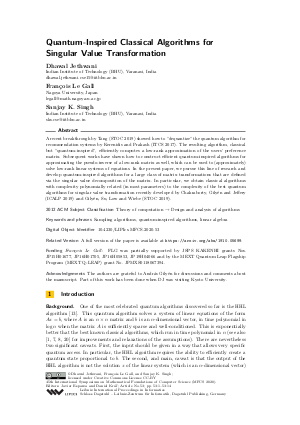Quantum-Inspired Classical Algorithms for Singular Value Transformation
Authors Dhawal Jethwani, François Le Gall, Sanjay K. Singh
-
Part of:
Volume:
45th International Symposium on Mathematical Foundations of Computer Science (MFCS 2020)
Part of: Series: Leibniz International Proceedings in Informatics (LIPIcs)
Part of: Conference: Mathematical Foundations of Computer Science (MFCS) - License:
 Creative Commons Attribution 3.0 Unported license
Creative Commons Attribution 3.0 Unported license
- Publication Date: 2020-08-18
File

PDF
LIPIcs.MFCS.2020.53.pdf
- Filesize: 0.52 MB
- 14 pages
Document Identifiers
Related Versions
-
A full version of the paper is available at https://arxiv.org/abs/1910.05699.
Subject Classification
ACM Subject Classification
- Theory of computation → Design and analysis of algorithms
Keywords
- Sampling algorithms
- quantum-inspired algorithms
- linear algebra
Metrics
- Access Statistics
-
Total Accesses (updated on a weekly basis)
0PDF Downloads0Metadata Views
Abstract
A recent breakthrough by Tang (STOC 2019) showed how to "dequantize" the quantum algorithm for recommendation systems by Kerenidis and Prakash (ITCS 2017). The resulting algorithm, classical but "quantum-inspired", efficiently computes a low-rank approximation of the users' preference matrix. Subsequent works have shown how to construct efficient quantum-inspired algorithms for approximating the pseudo-inverse of a low-rank matrix as well, which can be used to (approximately) solve low-rank linear systems of equations. In the present paper, we pursue this line of research and develop quantum-inspired algorithms for a large class of matrix transformations that are defined via the singular value decomposition of the matrix. In particular, we obtain classical algorithms with complexity polynomially related (in most parameters) to the complexity of the best quantum algorithms for singular value transformation recently developed by Chakraborty, Gilyén and Jeffery (ICALP 2019) and Gilyén, Su, Low and Wiebe (STOC 2019).
Cite As Get BibTex
Dhawal Jethwani, François Le Gall, and Sanjay K. Singh. Quantum-Inspired Classical Algorithms for Singular Value Transformation. In 45th International Symposium on Mathematical Foundations of Computer Science (MFCS 2020). Leibniz International Proceedings in Informatics (LIPIcs), Volume 170, pp. 53:1-53:14, Schloss Dagstuhl – Leibniz-Zentrum für Informatik (2020)
https://doi.org/10.4230/LIPIcs.MFCS.2020.53
BibTex
@InProceedings{jethwani_et_al:LIPIcs.MFCS.2020.53,
author = {Jethwani, Dhawal and Le Gall, Fran\c{c}ois and Singh, Sanjay K.},
title = {{Quantum-Inspired Classical Algorithms for Singular Value Transformation}},
booktitle = {45th International Symposium on Mathematical Foundations of Computer Science (MFCS 2020)},
pages = {53:1--53:14},
series = {Leibniz International Proceedings in Informatics (LIPIcs)},
ISBN = {978-3-95977-159-7},
ISSN = {1868-8969},
year = {2020},
volume = {170},
editor = {Esparza, Javier and Kr\'{a}l', Daniel},
publisher = {Schloss Dagstuhl -- Leibniz-Zentrum f{\"u}r Informatik},
address = {Dagstuhl, Germany},
URL = {https://drops.dagstuhl.de/entities/document/10.4230/LIPIcs.MFCS.2020.53},
URN = {urn:nbn:de:0030-drops-127193},
doi = {10.4230/LIPIcs.MFCS.2020.53},
annote = {Keywords: Sampling algorithms, quantum-inspired algorithms, linear algebra}
}
Author Details
Funding
- Le Gall, François: FLG was partially supported by JSPS KAKENHI grants Nos. JP15H01677, JP16H01705, JP16H05853, JP19H04066 and by the MEXT Quantum Leap Flagship Program (MEXT Q-LEAP) grant No. JPMXS0118067394.
Acknowledgements
The authors are grateful to András Gilyén for discussions and comments about the manuscript. Part of this work has been done when DJ was visiting Kyoto University.
References
- Andris Ambainis. Variable time amplitude amplification and quantum algorithms for linear algebra problems. In Proceedings of the 29th International Symposium on Theoretical Aspects of Computer Science, pages 636-647, 2012. URL: https://doi.org/10.4230/LIPIcs.STACS.2012.636.
-
Juan Miguel Arrazola, Alain Delgado, Bhaskar Roy Bardhan, and Seth Lloyd. Quantum-inspired algorithms in practice. arXiv:1905.10415, 2019.

-
Jacob Biamonte, Peter Wittek, Nicola Pancotti, Patrick Rebentrost, Nathan Wiebe, and Seth Lloyd. Quantum machine learning. Nature, 549:195–202, 2017.

-
Shantanav Chakraborty, András Gilyén, and Stacey Jeffery. The power of block-encoded matrix powers: Improved regression techniques via faster Hamiltonian simulation. In Proceeding of the 46th International Colloquium on Automata, Languages, and Programming, pages 33:1-33:14, 2019.

-
Nai-Hui Chia, András Gilyén, Tongyang Li, Han-Hsuan Lin, Ewin Tang, and Chunhao Wang. Sampling-based sublinear low-rank matrix arithmetic framework for dequantizing quantum machine learning. In Proceedings of the 52nd Annual ACM Symposium on Theory of Computing, to appear, 2020. arXiv:1910.06151.

-
Nai-Hui Chia, Han-Hsuan Lin, and Chunhao Wang. Quantum-inspired sublinear classical algorithms for solving low-rank linear systems. arXiv:1811.04852, 2018.

-
Andrew M. Childs, Robin Kothari, and Rolando D. Somma. Quantum algorithm for systems of linear equations with exponentially improved dependence on precision. SIAM Journal on Computing, 46(6):1920-1950, 2017.

-
B. David Clader, Bryan C. Jacobs, and Chad R. Sprouse. Preconditioned quantum linear system algorithm. Physical Review Letters, 110:250504, 2013.

-
Alan Frieze, Ravi Kannan, and Santosh Vempala. Fast Monte-Carlo algorithms for finding low-rank approximations. Journal of the ACM, 51(6):1025-1041, 2004.

-
Michael I. Gil. Perturbations of functions of diagonalizable matrices. Electronic Journal of Linear Algebra, 27(1):645, 2014.

-
András Gilyén, Seth Lloyd, and Ewin Tang. Quantum-inspired low-rank stochastic regression with logarithmic dependence on the dimension. arXiv:1811.04909, 2018.

-
András Gilyén, Yuan Su, Guang Hao Low, and Nathan Wiebe. Quantum singular value transformation and beyond: exponential improvements for quantum matrix arithmetics. In Proceedings of the 51st Annual ACM SIGACT Symposium on Theory of Computing, pages 193-204, 2019.

-
Aram W. Harrow, Avinatan Hassidim, and Seth Lloyd. Quantum algorithm for solving linear systems of equations. Physical Review Letters, 15(103):150502, 2009.

-
Iordanis Kerenidis and Anupam Prakash. Quantum recommendation systems. In Proceedings of the 8th Innovations in Theoretical Computer Science Conference, pages 49:1-49:21, 2017.

-
Seth Lloyd, Masoud Mohseni, and Patrick Rebentrost. Quantum principal component analysis. Nature Physics, 10:631–633, 2014.

-
Patrick Rebentrost, Masoud Mohseni, and Seth Lloyd. Quantum support vector machine for big data classification. Physical review letters, 113(13):130503, 2014.

-
Ewin Tang. Quantum-inspired classical algorithms for principal component analysis and supervised clustering. arXiv:1811.00414, 2018.

-
Ewin Tang. A quantum-inspired classical algorithm for recommendation systems. In Proceedings of the 51st Annual Symposium on Theory of Computing, pages 217-228, 2019.

-
Hermann Weyl. Das asymptotische verteilungsgesetz der eigenwerte linearer partieller differentialgleichungen (mit einer anwendung auf die theorie der hohlraumstrahlung). Mathematische Annalen, 71(4):441-479, 1912.

-
Leonard Wossnig, Zhikuan Zhao, and Anupam Prakash. Quantum linear system algorithm for dense matrices. Physical Review Letters, 120:050502, 2018.

